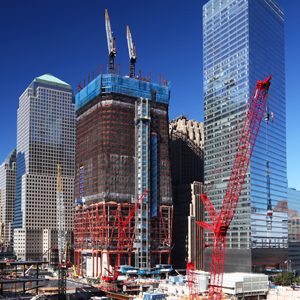
Crane regulation in New York City has had its ups and downs, but the city hopes to make work safer by boosting the requirements of operators working there. One part of the city's controversial new licensing program, announced earlier this month, is outsourcing crane operator exams to the private sector. The move has attracted praise and criticism alike.
By July 1, 2013, all crane operators working in New York City would need to pass a national crane exam accredited by the National Commission for Certifying Agencies or the American National Standards Institute. In addition, candidates must prove that they have several years of experience working in a dense, urban core such as New York City. This comes at the same time a New York judge is weighing a manslaughter conviction of local crane owner James F. Lomma for a fatal tower-crane collapse in 2008—a case that hinges on facts related to critical crane maintenance, operation and oversight.
Recent crane tragedies in New York City obscure a long-standing history of private, national testing. For nearly two decades, private organizations like the National Commission for the Certification of Crane Operators—in 2008, I was certified by NCCCO to operate tower cranes—have offered standardized tests for hoisting crews. Since the advent of those tests, it has become more common for U.S. jurisdictions to recognize the tests as meeting basic skill requirements. Indeed, in 2010, the U.S. Occupational Safety and Health Administration enacted new rules that would require crane operators across the country to pass a nationally-accredited exam by Nov. 10, 2014. This is the first time in the U.S. that crane operators would need to be tested nationwide.
Skill assessment used to fall squarely in the hands of government agencies, unions, employers and owners. The move toward national certification has continually come under criticism from groups who fear that the industry will lose control over who it allows to sit in the seat of a crane. The effect, they say, will make jobsites more dangerous. Licensing boards counter that the rationale for standardizing this kind of specialized testing outweighs those fears.
Before we go deeper, a quick primer on definitions: A certification is a test. An accreditation scrutinizes the merits of the test. A license is a government-administered certification. Few experts disagree on this.
Now, let's take a look at some of the reasons why cities like New York are privatizing their crane operator exams.
Back to Basics
A central argument in favor of national certification is that the test is a self-filtering process, and it sets a consistent floor for basic crane operations. Like a college-entrance exam, a person who passes a standardized test has proven that he or she has acquired basic knowledge and skills. The flipside is that if you fail the exam, you have shown that you haven't yet learned the fundamentals. Get out the flash cards; you need to run more drills before you can prove you have the right stuff.
Those who argue against standardized testing say it waters down the profession by appealing to the lowest common denominator and encourages training to the test. I can't tell you how many times I've have heard the expression, "It takes two years of styling hair to wield a pair of scissors in a barber shop, but it only takes two hours to pass the NCCCO exam and run a crane on a jobsite." This worn-out refrain perpetuates the fallacy that a test measures experience, which it doesn't.
As I reported in ENR in an exhaustive story on certification, a simple test gauges how quickly—and safely—you can pick up and swing a load. But it doesn't measure how many hours you have spent in the seat of a crane. Indeed, I spent no more than 60 hours operating before I managed to pass the NCCCO tower crane exam. Does that make me an awesome crane operator?


Post a comment to this article
Report Abusive Comment